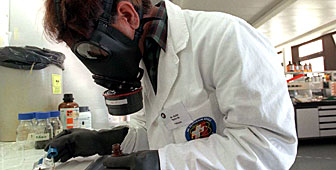Swiss pharmaceutical firms address bioterrorism threat

Switzerland's pharmaceutical industry has drawn up guidelines to stop dangerous chemicals falling into the hands of terrorists.
The charter – a set of best practice principles signed by three of the industry’s biggest names, Novartis, Roche and Serono – will regulate access to laboratories and ban the use of some substances.
The aim is to reduce the risk of products stored or made by the three companies ending up as raw material for the illegal creation of biological weapons.
Thomas Cueni, general secretary of Interpharma – the association of Swiss pharmaceutical companies – said other countries could benefit from Switzerland’s expertise in handling chemicals.
“Switzerland is one of the leading countries in terms of pharmaceutical expertise and also in terms of using best practices to make sure that you have taken all the necessary precautions to prevent abuse [of chemical substances],” Cueni told swissinfo.
“What you want to make sure is that there are very firm rules about who is allowed to deal with biological materials, how you stock them and how you control them,” he added.
American initiative
The new guidelines are based on an American initiative, and the hope is that they will serve as a model for the pharmaceutical industry worldwide.
The idea was first proposed at the World Economic Forum summit in New York, held in 2002 for the first time away from its traditional venue in the Swiss resort of Davos.
At the meeting, industry leaders and American government representatives held a series of informal meetings about the risks of bioterrorism.
Discussions centred on the potential threat of terrorists targeting pharmaceutical companies to obtain the technical know-how and materials for creating biological weapons.
Mercer Reynolds, the United States ambassador to Bern, mooted the idea that Swiss companies should draw up a list of security measures – a suggestion which has now been acted upon.
The charter – entitled “Principles to Avoid the Abusive Use of Biologically Dangerous Substances or Materials” – has been followed by Swiss companies for some time.
No replacement for UN convention
But the pharmaceutical industry says the set of best practice principles can in no way replace a United Nations convention banning biological weapons.
“As a core part of society dealing with the risk of abuse of biological materials, you need internationally binding agreements and enforcement mechanisms, ” said Cueni.
“That’s why when we started to talk about a set of best practice principles, we always said that it could only complement and not be a substitute for these internationally binding mechanisms.”
Cueni said the Swiss government and the country’s pharmaceutical industry are supporting efforts to make the UN convention legally binding.
“Member states have still not been able to agree on a compliance protocol,” he said.
Negotiations began seven years ago, but have since stalled following Washington’s refusal to allow inspections of its laboratories by international teams.
by Michel Walter

In compliance with the JTI standards
More: SWI swissinfo.ch certified by the Journalism Trust Initiative









You can find an overview of ongoing debates with our journalists here . Please join us!
If you want to start a conversation about a topic raised in this article or want to report factual errors, email us at english@swissinfo.ch.